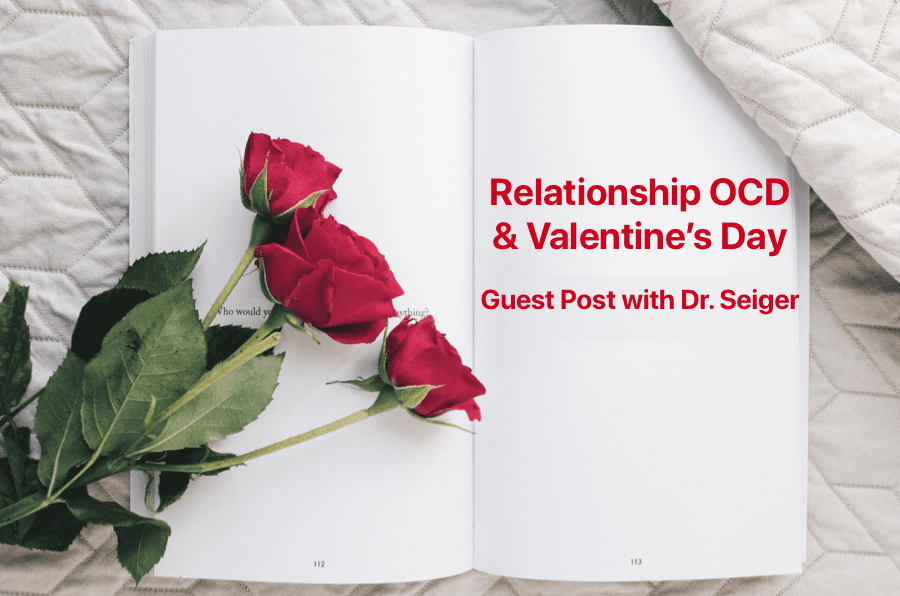Relationship OCD, or ROCD, is a type of OCD characterized by obsessive, unwanted thoughts about intimate relationships. People with ROCD tend to be consumed by doubts about their partner: Do they love me enough? Am I as attracted to them as I should be? Are we compatible enough?
It’s normal for errant thoughts like these to creep into even the best relationships every once in a while. However, feeling overwhelmed by constant, persistent doubts, whether or not there’s a rational reason to worry, might be a sign that ROCD is taking over.
Valentine’s Day may be an especially tough holiday for people with ROCD. The societal pressure to be in a “perfect” relationship can seem overwhelming in February: we’re surrounded by hearts, candy, greeting cards, and love songs practically everywhere we go. Our friends and family members might be discussing their Valentine’s Day plans or asking about ours. Maybe a partner has high expectations for the holiday.

Whether you’re single or in a relationship, the thoughts and feelings that come with ROCD might feel so intense in February that you’d rather avoid Valentine’s Day altogether! Avoidance can feel like the best option in the moment. After all, why would you purposefully engage in something that will just make you feel anxious? But avoiding situations that might trigger your obsessions and cause distress is actually counterproductive to OCD recovery, and will only serve in the long term to make symptoms more severe. Instead of avoiding the holiday, try planning and practicing exposures around the things that trigger anxiety—whether or not you have an intimate partner.

Let’s say you are in some kind of intimate relationship. If ROCD causes you to feel an immense amount of pressure to make the holiday “perfect” for your partner, you might spend days picking out a gift or making a card. This may involve carefully considering the cost, size, and meaning of the present, or repetitive, agitating consideration of whether or not it accurately represents the love you feel (or think you should feel) for your partner.
You might also feel uncertain about how your partner might have spent Valentine’s Day with someone else in the past, imagining all kinds of scenarios. When the anxiety becomes intolerable, you may ask about the types of gifts they and their former partner exchanged or the activities they engaged in. It can feel impossible not to compare this to your relationship. Was that other person better than me? Did my partner love them more? Have they had more intimate experiences with another partner than with me? As the questions swirl, you might feel like asking your partner for reassurance in order to just get rid of the anxiety for a while.
Instead of giving into this pressure from OCD to seek reassurance, try using these kinds of situations as inspiration for doing exposures. Try limiting the amount of time you spend picking out a restaurant to fifteen minutes, and draw a picture or imagine a scenario in which your partner doesn’t like the restaurant you chose. What would this feel like? What might the consequences be? Write out the worst-case scenario and read it out loud a few times. Leaning into your thoughts can feel scary in the moment, but it is the basis for effective exposure and response prevention (ERP). When we’re able to handle discomfort, obsessions lose their power over us.

It’s easy to forget this on Valentine’s Day, but people without intimate partners are often just as deeply engaged in romantic rumination. You might see couples walking around, doing the things intimate partners are supposed to be doing, and start to wonder why you’re not in a similar kind of situation. For people with ROCD, these feelings of loneliness and sadness can prompt an onslaught of obsessive thoughts: What if I’m not good enough? How can I be sure that I’ll have something like this one day too?
Because these kinds of thoughts tend to produce a lot of distress, people with OCD turn to compulsions. These behaviors can be a bit sneaky: maybe you find pictures of people on social media and wonder why they have partners while you don’t; maybe you tell friends and family that you think you’ll be alone forever in the hope that they’ll say otherwise.
No matter what the compulsion, exposing yourself to thoughts and worries and sitting with the discomfort that comes from them can help you feel better long-term, not just on February 14. If you’re constantly trying to prove to yourself that you won’t be alone forever, try writing out all the reasons that you think you’ll never find an intimate partner. Make sure they’re reasons you really believe, and read them to yourself twice a day. If OCD makes you want to be sure you’ll be in a relationship one day, record a story about being alone forever on your phone and listen to it twice a day.
I once worked with a couple where both partners had ROCD. They planned their handmade gifts months in advance. They made a professional film, flew to a foreign country, and even brought in a chef to create a lavish meal! Most people don’t reach this extreme, but this illustrates how ROCD can completely take over when the OCD bully in your brain tries to seek one hundred percent certainty about your relationship or your choice of partner.
If OCD is starting to ruin your Valentine’s Day, try using your triggers to plan effective exposures. By next year, Valentine’s Day could be your favorite holiday.
If you or someone you know is struggling with ROCD or another subtype of OCD, schedule a free call today with the NOCD care team to learn more about how a licensed therapist can help. At NOCD, all therapists specialize in OCD and receive ERP-specific training. ERP is most effective when the therapist conducting the treatment has experience with OCD and training in ERP. You can also join our Relationship OCD community and get 24/7 access to personalized self-management tools built by people who have been through OCD and successfully recovered.
This article is a guest contribution from Dr. Belinda Seiger, PhD, LCSW. Dr. Seiger has substantial training from the world-renowned Child & Adolescent OCD, Tic, Trich & Anxiety Group (The COTTAGe). She received her PhD from New York University and her Master’s degree from Columbia University. She has more than 20 years of experience providing compassionate, friendly treatment for anxiety, OCD, neurodiversity, mood, and learning issues. Her approach draws upon evidence-based approaches like cognitive behavioral therapy, positive psychology, and neuroscience.

